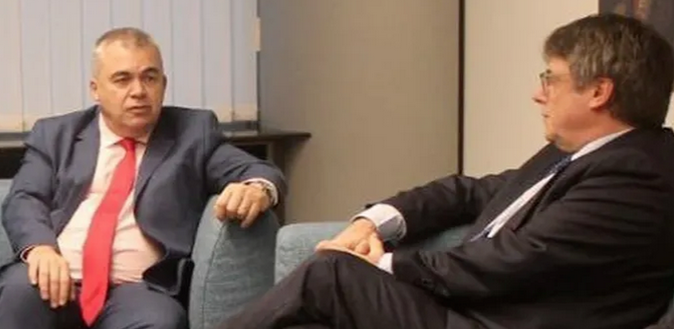The pact reached between the PSOE and Junts for the investiture of Pedro Sánchez involves a cession of the socialists in everything demanded by the Catalan ex-president Carles Puigdemont, fugitive from justice. It includes an international mediator who “has the functions of accompanying, verifying and monitoring the negotiation process and the agreements” and will grant amnesty for crimes related to the procés since 2012, before the November 9th consultation in 2014, and until this year. The document speaks of a first negotiating table to be set up this month in which Junts will propose holding a referendum of self-determination on the political future of Catalonia within the framework established by the Constitution, while the PSOE “will defend the broad development of the Statute of 2006 as well as the full deployment and respect for the institutions of self-government and institutional uniqueness”. The pro-independence supporters will also demand the transfer of 100% of taxes.
On the other hand, the four-page agreement pledges to study, through “commissions of enquiry to be set up in the next legislature”, the application of the amnesty law for “situations included in the concept of lawfare or judicialisation of politics”, which could include the cases affecting Gonzalo Boye, Carles Puigdemont’s lawyer, and the former president of the Parliament Laura Borrás.
The document, of only four pages, commits the votes in favour of the seven deputies of Junts for the investiture of Pedro Sánchez, which will be finalised in the coming days, and there is no express renunciation of unilateralism. The “stability of the legislature”, it notes, will be “subject to the progress and fulfilment of the agreements resulting from the negotiations” that will begin from now on.
The agreement makes a first account that goes back to the 2010 Constitutional Court ruling that annulled several articles of the Statute and the PSOE assumes “a massive participation in favour of the independence of Catalonia” both in the 2014 consultation and in the 2017 referendum. On this point, Junts “considers the result and the mandate” of 1-O to be legitimate, while the PSOE “denies any legality and validity to the referendum and the declaration, and maintains its rejection of any unilateral action”.
As for the amnesty law, PSOE and Junts argue that it aims to “ensure full political, institutional and social normality”. The law, which will be registered in the coming days, will cover a period of more than ten years, from 2012, that is, before the consultation of November 9 2014 organised by the government of Artur Mas, condemned by the Court of Auditors for this reason. It will also include, as planned, all those indicted in relation to the 2017 procés, but it will be extended to this year, which could affect the terrorism case on Tsunami Democràtic that is investigating Puigdemont.
A priori, the agreement suggests that this amnesty law will not include cases defined by the pro-independence movement as lawfare or “judicial persecution”, but the PSOE assumes that they may have existed, as the text does establish that commissions of enquiry will be set up in this legislature – it does not say in which institutions, but it could be either in Congress or in the Catalan Parliament – whose conclusions “will be taken into account in the application of the amnesty law insofar as situations could arise that fall under the concept of lawfare or the judicialisation of politics, with the consequences that, where appropriate, could give rise to actions of responsibility or legislative modifications”.
As for the “deficits and limitations of self-government”, Junts says it will “propose an amendment to the Organic Law on the Financing of Autonomous Communities that establishes an exception clause for Catalonia” with the aim of “recognising its uniqueness” and facilitating the “transfer of 100% of all taxes paid in Catalonia”. The PSOE, on the other hand, states that it “will support measures that allow Catalonia financial autonomy and access to the market, as well as a unique dialogue on the impact of the current financing model on Catalonia”.
It will also address, the text continues, “the essential elements of a plan to facilitate and promote the return to Catalonia of the headquarters of companies that have moved their headquarters to other territories” in the country as a result of the procés.
To achieve the agreements, the document adds, they agree to set up a “mechanism between the two organisations, international”, which they do not define as a mediator, but they do specify that it will have “the functions of accompanying, verifying and monitoring the entire negotiation process and the agreements reached between the two groups”.





